SIU Athletics rescinds activism ban, legal experts weigh in on Code of Conduct addition
Sophomore cheerleader, Alaysia Brandy, kneels behind Saluki Shakers during the national anthem Monday, Nov. 27, 2017, during the Salukis’ loss to the SIU Edwardville Cougars at SIU Arena. A recent change in protocol put into place by SIU Athletics has removed the cheerleaders from the playing surface of sporting events during the national anthem. (Brian Munoz | @BrianMMunoz)
August 30, 2018
SIU Athletics has rescinded new language in the Student Athlete Code of Conduct that said any displays of activism will not be tolerated and could lead to the individual’s removal from their respective program.
“It is a privilege and not a right to be a student-athlete, cheerleader or spirit member at Southern Illinois University,” according to the rescinded addition originally provided by Liz Jarnigan, SIU Athletics senior woman administrator.
“Members of the department including student athletes cheerleaders and spirit members must remain neutral on any issue political in nature when wearing SIU official uniforms and when competing/performing in official department of athletics events and activities,” according to the addition. “Any display (verbal or non-verbal) of activism (either for or against) a political issue will not be tolerated and may result in dismissal from the program.”
Tom Weber, associate athletic director over communications, said that the purpose of the addition was to display unity and to provide a positive experience for student-athletes and Saluki fans.
“However, some have interpreted the language to suggest that our aim was to restrict the free speech rights of our students – that was never our intent,” Weber said. “We fully support the free expression of ideas and opinions among our students and the entire Saluki family.”
Weber said given the community feedback it appeared that athletics “somewhat missed the mark” and do not plan to use it as currently written but would revisit the addition at a later date.
Praise and criticism for SIU Athletics has been voiced on social media after the Daily Egyptian released the story on the addition Tuesday. Questions and concerns over the language used arose from national organizations, such as the American Civil Liberties Union.
“Southern Illinois University’s new policy suggesting that players or cheerleaders could be removed from their respective program for peaceful ‘displays of activism’ falls short of the critical responsibility of a public university to honor and protect free speech rights for their students,” said Ed Yohnka, Director of Communications and Public Policy at the ACLU of Illinois.
William Freivogel, a media law professor at SIU, said the addition to the Code of Conduct does not make sense.
“The government can make neutral rules for students to follow and universities can set higher standards of conduct for athletes, cheerleaders and other student leaders,” Freivogel said. “But in the process, the government can’t discriminate based on the content or viewpoint of speech.”
Freivogel said the university cannot punish a student leader for taking a knee during the anthem if the school is also not prepared to “punish pro-flag, pro-military or Tim Tebow-style religious gestures.”
Gregory Magarian, a law professor at Washington University in St. Louis, said he shared similar sentiments.
“If we’re going to say there’s nothing political about standing for the national anthem then we are saying one of two things – we’re saying it’s meaningless, or we’re saying that we are absolutely forcing a consensus political view on everybody and it has political significance – and you will obey that political significance, or you are out.”
Magarian said he does not believe either of those situations are viable on their own terms.
Yohnka said it is more troubling that the policy specifically suggests such displays will not be tolerated on a political issue.
“A central purpose for any public university is to engage students and the community in the issues of our time,” Yohnka said. “Schools should not threaten students – or hide them away – because they engage in protests that some in the community may not agree with.”
Freivogel questioned the university’s stance on the addition and asked “how can the university say activism is bad for student leaders while non-involvement is good?”
“Rules favoring apathy over activism discriminate on the content of the speech – and they don’t make sense,” Freivogel said. “Don’t we want our student leaders to be activists in shaping society, not people who stand mutely on the sidelines?”
Magarian said the university picking and choosing what speech to ban creates an issue.
“What the university really seems to be saying is ‘We don’t want people making political noise because we’re trying to sell college athletics and politics are off-putting,’” Magarian said. “If the school is really treating political speech worse than other kinds of speech because political speech is more damaging to the brand – that’s not okay.”
Magarian said the claim that this is about sports, not about politics, is incoherent.
“I think that everything that we do or don’t do has political significance especially and obviously in environments where political ideas have manifestly been introduced into the environment,” Magarian said. “When [the cheerleaders] took a knee… they revealed, in a very straightforward and unmistakable way, the political content of that space.”
Weber said the department will be working with student-athletes to turn the language into a positive values statement related to the focus and purpose of athletics.
Staff reporter Brian Munoz can be reached at bmunoz@dailyegyptian.com or on Twitter at @BrianMMunoz.
To stay up to date with all your southern Illinois news, follow the Daily Egyptian on Facebook and Twitter.



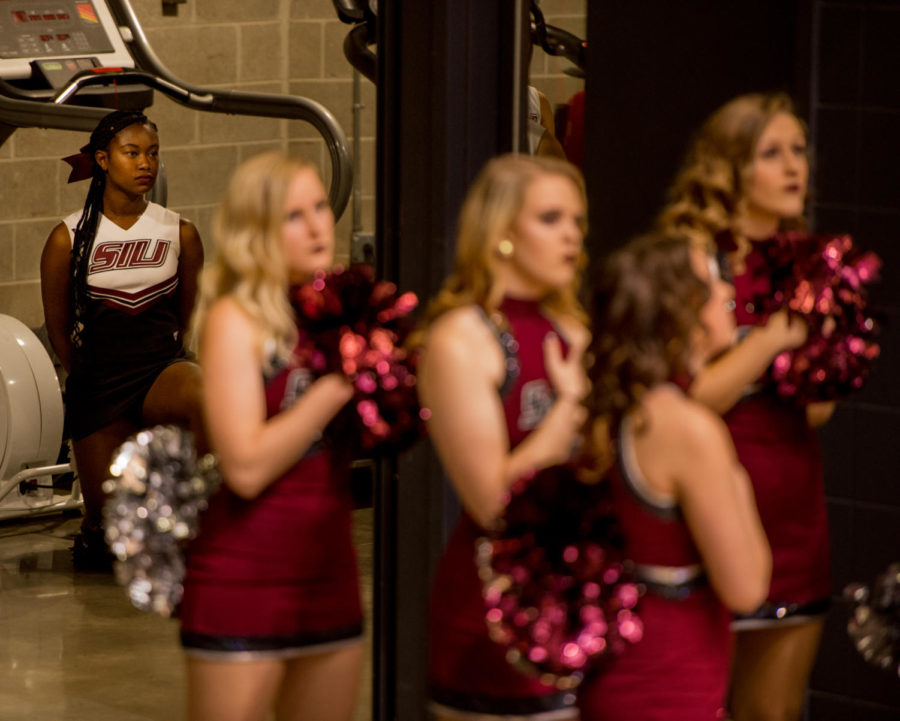
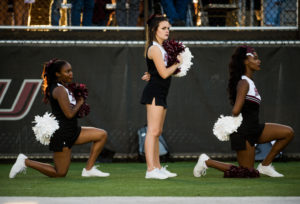
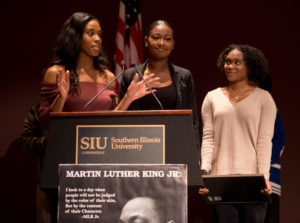
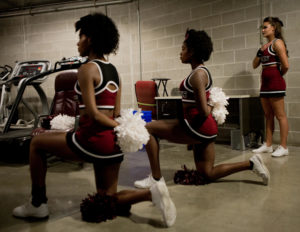
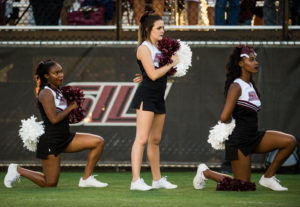





Arlene Posner • Aug 31, 2018 at 3:50 pm
As an alum from the turbulent 1960’s I find this policy more than disconcerting. We marched,, we protested, and often times we were heard. We were able to meet visiting personalities from many sides.
This policy is revoking freedom of speech. Please move forward and get rid of this suppression!
Virginia Tilley (Professor of Political Science, SIUC) • Aug 31, 2018 at 10:54 am
Not clear what you mean, Larry (if I may). Could you kindly explain? “This is America, here are the rules…” Are you referring to “rules” in the sense of our constitutional protections of free speech and open protest, which form a pillar of our democratic system and were bruised in this affair? Or are you referring to “rules” as collective flag and anthem rituals we sometimes employ in public settings, which have become a site for expressing political frustration? Anthem and flag rituals have nothing specific to do with “America.” Nazis and Italian fascists and pretty much every country in the world have the same. I just can’t tell from your language which way you are going.
I’d hope that, if you graduated from SIU and especially if there’s a scholarship in your name, that you’d celebrate these young people who do seem to have grasped what SIU is all about, whether or not you agree with them.
Tony Williams • Aug 31, 2018 at 10:17 am
Basically, a cowardly retreat after attempting to impose an authoritarian agenda in the spirit of Rita Cheng. If SIUC does collapse it will be due to the actions of higher administration who show no concern either for the Constitution of the United States in their initial attempts to ban a protest protected by the Bill of Rights nor supporting education, rather than Sports with its $4 million dollar annual deficit.
Tony Frank • Aug 31, 2018 at 9:49 am
In response to Larry Hoffman –
Monkeys run the zoo? Definite racism. Are you angry that people might speak up about injustice? Seems like mostly you are angry that black people want to protest unfairness. How does someone taking a knee affect you whatsoever? It’s funny that you say this is America yet you advocate for denying first amendment rights.
“Have a scholarship in my name.”
Wow, someone is extremely self-important. Over-privileged old white guy for sure. You’re the type that make us all look bad. I suggest you consider what the lives of others might be like before you get pissed that they have the audacity to protest the systematic abuse and murder of their race.
Dennis Presley • Aug 31, 2018 at 9:39 am
I’m a two-time graduate of SIUC and current A/P staff member. Kudos to Athletics Director Jerry Kill and SIU Athletics Senior Woman Administrator Liz Jarnigan for attempting to resolve this issue in a manner which prohibits anyone associated with Athletics from protesting the National Anthem while in an official capacity for the University. This IS NOT a Free Speech/First Amendment issue. ANYBODY, including the cheerleaders at issue or ANY athlete, may protest ANY issue they wish, ANYTIME on their OWN TIME. However, when representing the University, they are expected to abide by certain rules and display appropriate behaviors as determined by the University. The resolution in this matter is to abandon the currently proposed language in this policy, and simply state something to the effect of, “Person associated with Athletics will stand and follow official protocol during the National Anthem and other patriotic displays while in their official capacity and when representing Southern Illinois University Carbondale.” Period.
hobo • Aug 31, 2018 at 8:40 am
I may not agree with what you say, but I’ll defend your right to say it as I would any other part of our Constitution. We are Americans because of the laws and rights we have to protect freedom of speech, protest, press… As long as it is non-violent I think its fine. I don’t like it personally, but to prevent it makes us no better than North Korea, Iran, or any other totalitarian government.
Gary S. Beer • Aug 30, 2018 at 10:55 pm
Kudos goes out to the ACLU of Illinois for their advocacy on behalf of student’s 1st amendment rights.
Joshua Hellmann • Aug 30, 2018 at 9:34 pm
And I’m sure for every racist authoritarian like Larry in this comment section, another two alumni and community members are glad that SIU’s administration reversed its assault on peaceful dissent. We’re neither the land of the free nor home of the brave if nationalism is forced upon those who have legitimate grievances against how our country has been treating themselves and their fellows.
Marsden Bigby • Aug 30, 2018 at 8:33 pm
I wish you could stop that scholarship too. Clearly you have no idea what an education is supposed to be about. Land of the Free…if you dont like it…you can leave? That’s what y’all like to say right? This is America, here are the rules. It’s called the Constitution.
Cully Perlman • Aug 30, 2018 at 7:26 pm
America is about free speech. Politics these days, at SIU and in the White House, need to be re-evaluated.
Larry Hoffman • Aug 30, 2018 at 7:19 pm
SIU is a joke. When you are afraid to tell a student this is America, here are the rules, you might as well shutter the place. I was a proud alum but since the monkeys now run the zoo, I am done…no more $$$ responses to appeals. Have a scholarship in my name, wish I could stop it.
Alan Goldfarb • Aug 30, 2018 at 6:12 pm
The point is that police are killing black men for little provocation. Stop that, not protest!